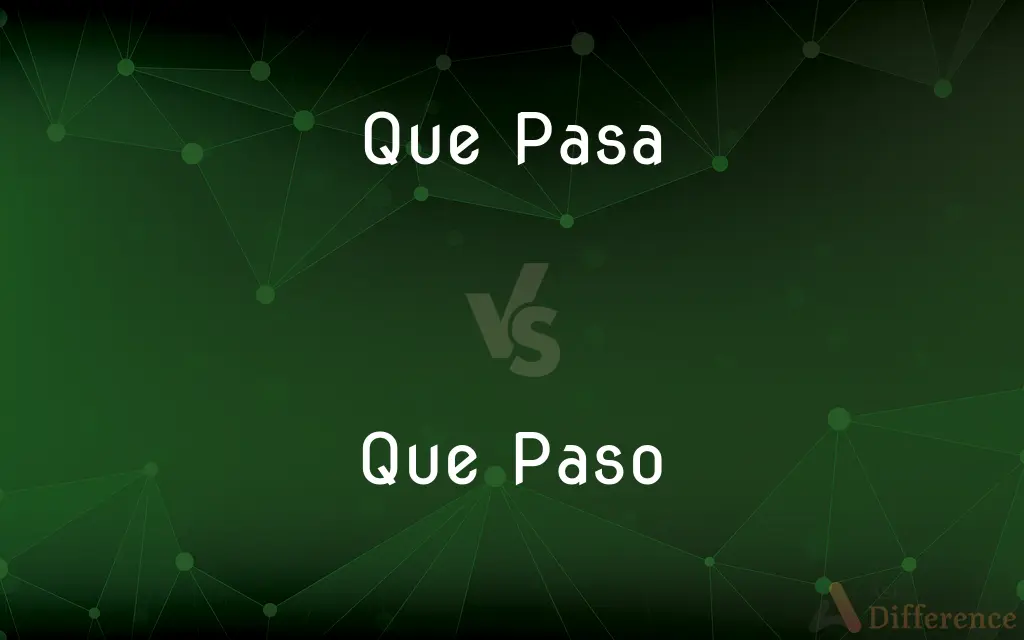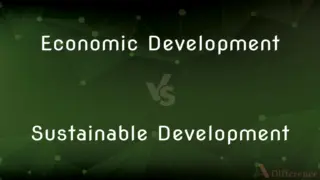Que Pasa vs. Que Paso — What's the Difference?
Edited by Tayyaba Rehman — By Fiza Rafique — Published on December 17, 2023
"Que Pasa" is Spanish for "What's happening?" or "What's going on?", while "Que Paso" translates to "What happened?".

Difference Between Que Pasa and Que Paso
Table of Contents
ADVERTISEMENT
Key Differences
"Que Pasa" is a commonly used Spanish phrase that inquires about what is currently happening or taking place. It's a present-tense question. On the other hand, "Que Paso" delves into the past, asking about an event or situation that already occurred.
The distinction between "Que Pasa" and "Que Paso" lies in their tense; the former is present, and the latter is past. "Que Pasa" is often used colloquially, similar to how one might say "What's up?" in English, indicating a casual greeting. In contrast, "Que Paso" is specifically aimed at understanding a past occurrence or event. It's essential to recognize the context in which each is used, as "Que Pasa" might be a light-hearted greeting, while "Que Paso" might require a more detailed explanation about something that transpired.
Comparison Chart
Translation
"What's happening?" or "What's going on?"
"What happened?"
Tense
Present
Past
Common Usage
Casual greeting
Inquiry about a past event
ADVERTISEMENT
Grammatical Element
Present indicative of "pasar"
Preterite (simple past) of "pasar"
Contextual Implication
Current events or situations
Previous events or situations
Compare with Definitions
Que Pasa
A colloquial greeting in Spanish-speaking cultures.
¡Hola! ¿Que Pasa? - Hello! What's up?
Que Paso
Past tense question related to an event or situation.
I missed the meeting. ¿Que Paso? - I missed the meeting. What happened?
Que Pasa
An informal way to seek clarification on the current topic.
I missed the beginning of the story. ¿Que Pasa? - I missed the beginning of the story. What's happening?
Que Paso
Asking about a specific incident in the past.
You seem upset. ¿Que Paso? - You seem upset. What happened?
Que Pasa
Present tense question about an ongoing situation.
¿Que Pasa in the kitchen? I hear noise. - What's happening in the kitchen? I hear noise.
Que Paso
Seeking an explanation about something already concluded.
I heard a loud noise earlier. ¿Que Paso? - I heard a loud noise earlier. What happened?
Que Pasa
A Spanish phrase inquiring about current events.
¿Que Pasa, amigo? - What's going on, friend?
Que Paso
A way to gather information about previous occurrences.
There's a mess here. ¿Que Paso? - There's a mess here. What happened?
Que Pasa
Asking about someone's current state or mood.
¿Que Pasa? You seem distant today. - What's going on? You seem distant today.
Que Paso
A Spanish phrase inquiring about past events.
¿Que Paso last night at the party? - What happened last night at the party?
Common Curiosities
What is the English translation of "Que Pasa"?
"Que Pasa" translates to "What's happening?" or "What's going on?".
Can "Que Pasa" be used as a greeting?
Yes, "Que Pasa" is often used colloquially, similar to "What's up?" in English.
Can "Que Pasa" be used to ask about a situation's status?
Yes, "Que Pasa" can inquire about the status or progression of a situation.
How does "Que Paso" differ from "Que Pasa"?
"Que Paso" asks about past events, translating to "What happened?", while "Que Pasa" is about the present.
Can "Que Paso" be used to ask about someone's well-being?
Typically, "Que Paso" is more about events than personal states, but context matters.
Is "Que Pasa" formal or informal?
"Que Pasa" is generally informal and used in casual conversations.
Is "Que Paso" related to a specific time frame?
Yes, "Que Paso" is a past tense inquiry, asking about something that already occurred.
What tense is "Que Pasa"?
"Que Pasa" is in the present tense.
How is the verb "pasar" used in "Que Paso"?
In "Que Paso", "pasar" is used in its preterite (simple past) form.
How would you use "Que Paso" in a sentence?
An example would be: "You seem sad, ¿Que Paso?" meaning "You seem sad, what happened?".
Do both "Que Pasa" and "Que Paso" originate from the verb "pasar"?
Yes, both phrases are derived from the Spanish verb "pasar" which means "to happen" or "to pass".
How does culture influence the use of "Que Pasa"?
In many Spanish-speaking cultures, "Que Pasa" is a common casual greeting, akin to "What's up?".
Which phrase would be more appropriate after an unexpected event?
"Que Paso" would be apt, as it inquires about past events.
Can "Que Paso" be used to gather details?
Yes, "Que Paso" seeks information or clarification about past occurrences.
Are both "Que Pasa" and "Que Paso" questions?
Yes, both are questions; the former inquires about the present, and the latter about the past.
Share Your Discovery

Previous Comparison
Kurta vs. Kurti
Next Comparison
Economic Development vs. Sustainable DevelopmentAuthor Spotlight
Written by
Fiza RafiqueFiza Rafique is a skilled content writer at AskDifference.com, where she meticulously refines and enhances written pieces. Drawing from her vast editorial expertise, Fiza ensures clarity, accuracy, and precision in every article. Passionate about language, she continually seeks to elevate the quality of content for readers worldwide.
Edited by
Tayyaba RehmanTayyaba Rehman is a distinguished writer, currently serving as a primary contributor to askdifference.com. As a researcher in semantics and etymology, Tayyaba's passion for the complexity of languages and their distinctions has found a perfect home on the platform. Tayyaba delves into the intricacies of language, distinguishing between commonly confused words and phrases, thereby providing clarity for readers worldwide.
















































